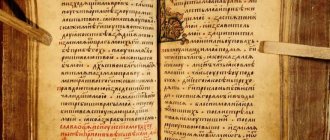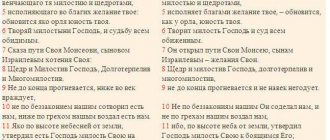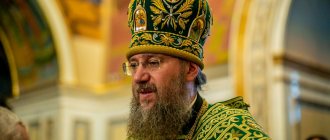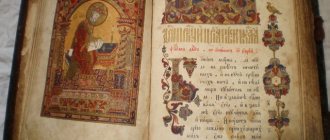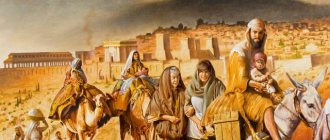Experts studying the “Psalter” were unable to accurately determine the period of writing Psalm 28. They did a colossal job of analyzing the text, in which great emphasis is placed on the “departure from the tabernacle,” which must be understood as the exit of the soul from the body, here the author carried out parallel with the priest leaving the camp temple. Returning to the topic of the soul, it should be noted that the body is a temporary refuge for it, leaving which it is filled with virtues that give it the opportunity to become part of the eternal abode.
Text of prayer Psalm 28
In Church Slavonic with accents
Psalm 28 is read during church services. For this, the Church Slavonic (Old Church Slavonic) language is used, which makes it possible to bring the words of prayer closer to the Lord so that he can hear the appeals of those praying.
Psalm to David, Exodus of the Tabernacle
1 Bring to the Lord, sons of God, bring to the Lord, sons of rams, bring to the Lord glory and honor.
2 Bring glory to His name to the Lord; worship the Lord in the courtyard of His holy ones.
3 The voice of the Lord is upon the waters, the God of glory will roar, the Lord is upon many waters.
4 The voice of the Lord is strong, the voice of the Lord is great.
5 The voice of the Lord breaks in pieces the cedars, and the Lord tears down the cedars of Lebanon:
6 And I shall become like the calf of Lebanon, and the beloved like the son of a unicorn.
7 The voice of the Lord cutting off the flames of fire.
8 The voice of the Lord shaking the wilderness, and the Lord will shake the wilderness of Kaddi.
9 The voice of the Lord brings forth the oil and opens the oak groves, and in His temple everyone speaks of glory.
10 The Lord inhabits the flood, and the Lord will sit as King forever.
11 The Lord will give strength to His people; the Lord will bless His people with peace.
In Russian
If for some reason a believer is unable to come to the service, he is allowed to read the prayer at home (in private). For this case, the text of Psalm 28 has been translated into Russian. You need to read it slowly, delving into every word in order to be filled with the grace of God:
Psalm of David. At the end of the tabernacle.
1 Bring to the Lord, sons of God, bring to the Lord young rams. Bring glory and honor to the Lord,
2 Give unto the Lord the glory of his name; worship the Lord in His splendid sanctuary.
3 The voice of the Lord is over the waters; The God of glory has thundered, the Lord is over many waters.
4 The voice of the Lord is powerful, the voice of the Lord is majestic.
5 The voice of the Lord breaks the cedars; The Lord breaks the cedars of Lebanon
6 and makes them leap like a calf, Lebanon and Sirion like a young unicorn.
7 The voice of the Lord cuts out a flame of fire.
8 The voice of the Lord shakes the wilderness; The Lord shakes the wilderness of Kadesh.
9 The voice of the Lord strengthens the deer, and He strips the forests open, and everyone in His temple proclaims glory.
10 The Lord sat over the flood, and the Lord will sit as king forever.
11 The Lord will give strength to His people; the Lord will bless His people with peace.
Text of Psalm 28
The Church Slavonic text of Psalm 28 is performed during services in the church. Old Church Slavonic, according to many, brings prayer to God as close as possible, so the believer has no doubt that his requests will be heard.
With accents in Church Slavonic
In Russian
Sometimes circumstances do not allow Christians to often go to church or attend services. In this case, they are recommended to turn to the Lord privately, that is, at home. At home, it is more convenient to read the Russian text, a modern translation of Psalm 28. They pronounce its lines slowly, trying to delve into every word, filled with grace from above.
Interpretation
To better understand the content of the prayer, it is necessary to analyze each verse. With the help of this interpretation, it becomes clear why Psalm 28 is read.
- Verses 1-2: Emotionally charged verses, filled with a sense of admiration for the Lord, reinforced by the threefold repetition of the word “Render.” The appeal is addressed to the “sons of God,” who in some cases are perceived as people, and in others as angels. The Russian translation is more inclined to convert the mighty of this world, whom David calls the sons of God.
- Verses 3-4: The voice of the Lord is in the thunderclaps that are heard against the backdrop of a thunderstorm.
- Verses 5-7: They describe a thunderstorm when centuries-old cedars are broken and uprooted and roll down the slopes of the mountains. The voice of God striking out the flame of fire signifies a bolt of lightning.
- Verses 8-9: tell how the animal kingdom reacts to a thunderstorm. One of the phenomena recorded in fallow deer frightened by a thunderstorm is premature birth.
- Verses 10-11: David compares the great thunderstorm to the flood that the Lord sent upon the earth and oversaw it. This once again emphasizes the greatness of God and his omnipotence over the world. The last line inspires confidence that God will not leave the people of Israel with his mercy, will bless them and give them strength.
( 3 ratings, average: 5.00 out of 5)
History of writing
As mentioned above, the exact time of composition of Psalm 28 is unknown to experts, since this work is difficult to associate with certain events in the author’s life, with the circumstances that inspired him to this work. And yet, historians and theologians put forward some assumptions on this matter.
They do not exclude that the song was written by the king when he witnessed the manifestation of the power of the Almighty. He considered this to be the strongest thunderstorm. Taking this into account, some in their interpretations called the work “Song of a Thunderstorm.”
Links[edit]
- Quote from Charles Augustus Briggs; Emily Grace Briggs (1960) [1906]. A critical and exegetical commentary on the book of psalms
.
International critical commentary. 1
. Edinburgh: T&T Clark. paragraph 245. - For the quote, see Charles Augustus Briggs; Emily Grace Briggs (1960) [1906]. A critical and exegetical commentary on the book of psalms
.
International critical commentary. 1
. Edinburgh: T&T Clark. paragraph 246. - For the date of the expulsion, see Arthur G. Bellinzoni. The Old Testament: An Introduction to Biblical Scholarship
. Prometheus Books, Publishers. item 349. ISBN 978-1-61592-264-2. - "Teillim - Psalms - Chapter 28". Chabad.org. 2022. Retrieved September 24, 2022.
- Spurgeon, S., David's Treasury: Psalm 28
- Complete Artscroll Siddur, 64 pages
Man is an ungrateful, forgetful and evil creature. Therefore, it would not hurt us to remind ourselves that we owe something to our Benefactor, God. A little. But thanking Him every day for everything that we have from His hand is our holy duty. So that we don’t become arrogant in our thoughts and think that “we ourselves have a mustache” and get all the prosperity for ourselves: even waking up in the morning and seeing the sunshine is not in our power. David reminds of this to everyone who reads him from then to this day. And who wants to please Jehovah.
28:3-6 The voice of the Lord is over the waters; The God of glory has thundered, the Lord is over many waters. 4 The voice of the Lord is powerful, the voice of the Lord is majestic. 5 The voice of the Lord breaks the cedars; The Lord breaks down the cedars of Lebanon 6 and makes them leap like a calf, Lebanon and Sirion, like a young unicorn.
About the power and greatness of the voice of the Lord: who will doubt it? For the Lord will speak and BEcome as he says with His voice. But it will be necessary - and the cedars of Lebanon will dance at His voice. Or these mighty trees will be torn out by the roots: everything, according to the voice of the Almighty, happens what should happen, for He is the GIVER TO BECOME everything that, in His opinion, should BECOME (take place).
28:7-9 The voice of the Lord cuts out a flame of fire. 8 The voice of the Lord shakes the wilderness; The Lord shakes the wilderness of Kadesh. 9 The voice of the Lord loosens the burden of the deer and strips the forests bare;
It will be necessary - and the whole earth will burst into flames at the voice of the Creator, and the desert will begin to shake (although, in theory, it is not a mountainous area, but if the Lord needs it, then it too will become a volcano). And the forest will become bald, and the doe will give birth to cubs - everything on this earth is accomplished according to the voice of Jehovah. And it would be nice for people to remember this all their lives.
and in His temple everything proclaims [His] glory.
Interestingly, it says here that in His temple EVERYTHING proclaims Him. But we are not talking about the building of the temple: about the whole earth, where signs of the presence of God are everywhere you look, in the desert, and in the cedars, and in the deer. For the temple of God is His dwelling place, and He is omnipresent. That is why Jesus said that if you want to turn to the Father, there is no need to walk hundreds of kilometers in search of man-made temples. In any place on earth, where you stand in time and space, dare to reach out to God. And you will be heard (Matt. 6:6).
28:10,11 The Lord sat over the flood, and the Lord will sit as king forever. 11 The Lord will give strength to His people; the Lord will bless His people with peace.
God sits above everything that happens on earth and above the earth, like an aquarist above an aquarium. And His people are like fish in an aquarium. Neither hide nor hide. And He will sit as King over the earth forever, for one day, after the reign of Christ over the earth, God will be ALL and in ALL (1 Cor. 15:28). And all the inhabitants of the earth who remain in His “aquarium” for eternity will be blessed with peace forever.
Interpretation of the Psalms. Explanation of Psalm 28.
St. Athanasius the Great (†373)
Interpretation of the Psalms.
Explanation of Psalm 28.
Psalm to David, the exodus of the tabernacle. This psalm is sung after the rejection of the Israelites and the bringing in of the pagans in their place. This is also shown by the inscription: the exodus of the tabernacle, clearly indicating to us the exodus of the Israelites.
(1). Bring to the Lord, sons of God. He calls the holy Apostles the Sons of God, because he taught them to say: Our Father who art in heaven (Matthew 6:9). Bring to the Lord, sons of rams. By the name of the sons of rams he means those who were called by the Apostles from the people of Judah to faith in the Lord, or those who believed from among the pagans, since they were born of foolish fathers. Bring glory and honor to the Lord. He who does good brings glory to the Lord, according to what is said: let them see your good deeds and glorify your Father (Matthew 5:16); and also brings honor to those who practice good deeds, according to what has been said: honor the Lord with your righteous labors (Prov. 3:9).
(2). Worship the Lord in His holy courtyard. This gives us a clear command that we should not worship outside the Church; This was said because of heterogeneous gatherings. So, worship should not be outside the Church, but in the very court of God. Don’t invent for yourself, he says, special courts and gatherings. One is God's holy courtyard. By the name of the court one can also understand those who have ascended into heavenly residence.
(3). The voice of the Lord on the waters. He calls the multitude of those saved by waters “waters.” The waters are holy because rivers will flow from their bellies (John 7:38), that is, the spiritual teaching with which they give drink to those who listen. On such and such waters is the Lord. But, according to the story, Elijah, after the lack of rain, heard the voice of many waters. He also understands the voice of God and the Father in the Jordan saying: This is my beloved Son (Matthew 3:17), and this voice is likened to thunder.
(5). The voice of the Lord crushing cedars. Cedars in these words denote resistive forces. And the Lord plucks down the cedars of Lebanon. He calls the famous among the people of Judah Cedars of Lebanon; because in divine Scripture Lebanon is often called Jerusalem.
(6). And I will grow up like the calf of Lebanon. Taurus means altar. And the beloved is like a unicorn son. The beloved host of the Apostles became the son of unicorns. Unicorns are holy prophets and patriarchs, and their sons are holy Apostles; because in one God they had horn and strength.
(7). The voice of the Lord cutting off the flames of fire. He will understand the promise that he made to the saints, saying: if you pass through fire, the flame will not burn you (Isa. 43:2).
(8). The voice of the Lord shaking the desert. What is heard everywhere is called shaking here, as in the words: when Jesus entered, the whole city was shaken (Matthew 21:10). The Church of the pagans, which in ancient times had no knowledge of God, is called a desert. And the Lord will shake the Caddian desert. Cadiz is interpreted: holy; this means the holy Church of Christ.
(9). The voice of the Lord brings forth the tree and opens the oak groves. Helens are saints; and accomplishing means preparing; because He prepared and sent the holy Apostles, according to what was said: go and learn all languages (Matthew 28:19). The Church calls it oak groves because in ancient times it was the mother of barren trees. And in His temple all the glory the Lord prepared and sent the holy Apostles to put to flight the demons and bring the pagans to the knowledge of God.
(10). The Lord inhabits the flood. He calls the multitude of those who believed a flood, according to what was said: the whole earth will be filled with the knowledge of the Lord, just as the waters of the sea cover much (Hab. 2:14). And the Lord will sit as King forever. This is similar to what was said: every knee will bow (Isa. 45:23).
(eleven). The Lord will give strength to his people. And this is similar to what was said: I can do all things through Christ who strengthens me (Phil. 4:13). The Lord will bless His people with peace. And this is similar to what was said: My peace I give to you, My peace I leave with you (John 14:27).
Source: Works like those of our holy father Athanasius the Great, Archbishop of Alexandria. Part four. / Second edition, corrected and expanded. - STSL.: Own printing house, 1903. - P. 107-109.
What is the help for a believer from the 28th Orthodox Psalm?
no comments
The interpretation of the Christian Psalm 28 indicates that this song is a call to fellow believers to visit the sanctuary in honor of God to glorify His holy name. The circumstances and reasons for writing the psalm are unknown, but both in the Slavic Psalter and in the Jewish book of psalms Tehillim, it is noted as a song sung after the Feast of Tabernacles.
The text of the 28th Orthodox Psalm suggests that it was written either during or during a thunderstorm of unprecedented power that shook Israel. It is obvious that this thunderstorm struck the psalmist to such an extent that he saw in it a manifestation of God's power, which he wished to praise in his song. Describing the power of the Lord, capable of bringing down torrents of water to the earth, throwing lightning, tearing leaves from trees, and even crushing the cedars of Lebanon, known for their mighty fortress, David ends the psalm with the assurance that his people, who believe in Him and bring sacrifices to Him, He will leave forever and ever. In the Orthodox tradition, listening, reading and watching videos with the text of Psalm 28 is recommended for protection from storms, winds and thunderstorms, especially for sailors.
Read the text in Russian Psalm 28
Ascribe to the Lord, O sons of God, ascribe to the Lord glory and honor, ascribe to the Lord the glory of His name; worship the Lord in His splendid sanctuary. The voice of the Lord is over the waters; The God of glory has thundered, the Lord is over many waters. The voice of the Lord is strong, the voice of the Lord is majestic. The voice of the Lord breaks the cedars; The Lord breaks down the cedars of Lebanon and makes them leap like a calf, Lebanon and Sirion like a young unicorn. The voice of the Lord cuts out a flame of fire. The voice of the Lord shakes the wilderness; The Lord shakes the wilderness of Kadesh. The voice of the Lord releases the burden of the deer and strips the forests bare; and in His temple everything proclaims His glory. The Lord sat over the flood, and the Lord will sit as king forever. The Lord will give strength to His people, the Lord will bless His people with peace.
Orthodox Psalter, text of Psalm 28 in Church Slavonic language
Bring to the Lord, sons of God, bring to the Lord, sons of rams, bring to the Lord glory and honor; bring glory to the Lord to his name; worship the Lord in his holy courtyard. The voice of the Lord is on the waters, the God of glory roars, the Lord is on many waters. The voice of the Lord is in strength, the voice of the Lord is in splendor. The voice of the Lord crushing the cedars; and the Lord will destroy the cedars of Lebanon, and I will be consumed like the bull of Lebanon; and the beloved is like a son of a unicorn. The voice of the Lord cutting off the flame of fire. The voice of the Lord shaking the desert; and the Lord will shake the Qaddi desert. The voice of the Lord brings forth the tree and opens the oak groves; and in his temple everyone speaks glory. The Lord inhabits the flood, and the Lord will sit as king forever. The Lord will give strength to his people, the Lord will bless his people with peace.
